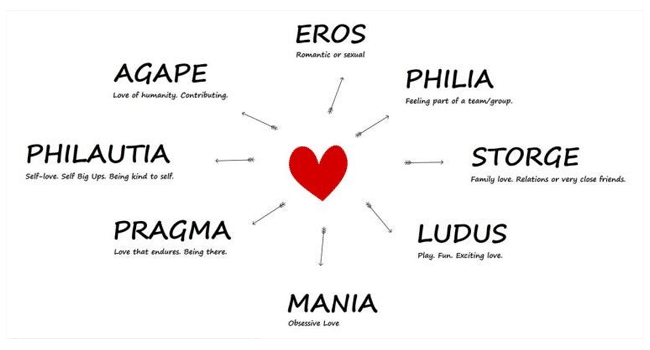English is such a weak language when it comes to expressing things like love. The Greeks for example used eight different words to express the concept of love. I struggle with the word love because it means so many different things to me. This blog is intended to talk through the different types of love with the added context kink and your kinky marriage. Your healthy marriage is the perfect formula of these types of love.
Eros – Romantic Love
Eros, or romantic and sexual love, takes on a dynamic and multifaceted role that intertwines with the exploration of BDSM dynamics. Firstly, eros serves as a catalyst for sexual exploration and expression within the marriage. Couples may engage in various forms of BDSM play as a means of enhancing their sexual intimacy, fulfilling fantasies, and discovering new dimensions of their sexuality together. The exploration of kink can provide a space for partners to communicate their desires openly, leading to a deeper understanding of each other’s needs and preferences in the bedroom.
The role of eros is deeply intertwined with the power dynamics that often characterize BDSM relationships. Within a kinky marriage, the exchange of power—such as dominance and submission—can be a source of intense eroticism and emotional connection. Consensual power exchange allows partners to explore their desires for control and surrender in a safe and trusting environment. Through these experiences, couples can cultivate a profound sense of intimacy and trust, strengthening the bond between them both emotionally and physically.
Eros plays a crucial role in fulfilling sexual fantasies and desires within the context of a kinky marriage. BDSM activities offer couples the opportunity to explore and indulge in a wide range of fetishes, role-playing scenarios, and erotic sensations. By embracing their fantasies together, partners can deepen their connection and create shared experiences that enhance their mutual attraction and satisfaction. Ultimately, eros serves as the foundation for navigating the complexities of BDSM dynamics within the marriage, ensuring that both partners feel loved, respected, and fulfilled in their exploration of kink together.
Philia – Affectionate Love
The role of philia, or deep friendship and companionship, is fundamental to the emotional foundation of the relationship. While eros—romantic and sexual love—may take center stage in many aspects of the marriage, philia provides a stable and supportive framework upon which the exploration of BDSM dynamics can flourish. Within the context of kink, philia manifests as a profound sense of camaraderie and mutual respect between partners, serving as the bedrock of trust and understanding necessary for engaging in consensual power exchange and exploration.
Philia also plays a crucial role in the communication and negotiation of boundaries within the kinky marriage. BDSM activities often involve intense and potentially risky forms of play, requiring partners to communicate openly about their desires, limits, and expectations. In a relationship grounded in philia, partners prioritize each other’s well-being and emotional safety, fostering an environment where they can freely express their needs and concerns without fear of judgment or rejection. This mutual respect and empathy form the basis for building trust and intimacy, both essential components of a fulfilling BDSM dynamic.
Philia contributes to the longevity and resilience of the kinky marriage over time. While the erotic and adventurous aspects of BDSM can be exhilarating, it is the deep bond of friendship and companionship that sustains the relationship through its ups and downs. Partners in a kinky marriage share not only their sexual desires but also their hopes, dreams, and everyday experiences, creating a rich tapestry of shared memories and mutual support. Philia enriches the journey of exploration and self-discovery within the kinky marriage, fostering a sense of connection and belonging that transcends the boundaries of erotic desire.
Storge – Familiar Love
The role of storge, or familial love and affection, can be observed in the deep sense of familiarity and belonging that partners develop over time. While storge may not be as explicitly highlighted in discussions of BDSM dynamics as eros or philia, its presence is often felt in the comfort and security that partners derive from their shared experiences and mutual understanding. Within the context of kink, storge manifests as a sense of emotional warmth and closeness that transcends traditional notions of romantic or sexual intimacy.
Storge plays a significant role in creating a safe and nurturing environment for the exploration of BDSM dynamics within the marriage. As partners engage in various forms of kink play, they rely on the familiar bonds of trust and care that characterize familial relationships to guide their interactions. This sense of emotional security allows partners to freely express their desires and vulnerabilities, knowing that they are supported and accepted by their spouse without judgment or condemnation.
Storge contributes to the sense of continuity and stability within the kinky marriage. As partners navigate the complexities of BDSM dynamics together, they draw upon the shared history and mutual experiences that have shaped their relationship over time. This sense of continuity provides a sense of grounding amidst the excitement and unpredictability of kink play, allowing partners to explore their desires with confidence and reassurance. Ultimately, storge enriches the connection between partners in a kinky marriage, fostering a deep sense of emotional intimacy and acceptance that enhances the overall quality of their relationship.
Ludus – Playful Love
The role of ludus, or playful love, is evident in the lighthearted and exploratory nature of the BDSM dynamics between partners. Ludus encompasses the element of fun, spontaneity, and enjoyment that couples experience as they engage in various forms of kink play together. Within the context of a kinky marriage, ludus manifests as a willingness to experiment, push boundaries, and embrace new experiences in the pursuit of mutual pleasure and excitement.
Ludus plays a significant role in fostering a sense of adventure and creativity within the relationship. Couples in a kinky marriage often engage in playful role-playing scenarios, indulge in erotic fantasies, and experiment with different forms of sensation play as a means of spicing up their sex lives and deepening their connection. The element of playfulness inherent in ludus allows partners to approach BDSM dynamics with curiosity and enthusiasm, transforming what might otherwise be perceived as taboo or intimidating into opportunities for shared exploration and enjoyment. Love at play is essential for creating a strong bonding experience. If your relationship isn’t play, it is by definition work. Don’t allow your relationship to become work, always keep your partner guessing and always make it fun. Make silly jokes and let your fun flag fly.
Ludus contributes to the sense of intimacy and camaraderie between partners in a kinky marriage. By embracing a playful attitude towards kink play, couples can strengthen their emotional bond and create lasting memories together. The laughter, teasing, and shared experiences that accompany ludus serve to deepen the connection between partners, fostering a sense of closeness and affection that enhances the overall quality of their relationship. Ultimately, ludus adds an element of joy and excitement to the dynamics of a kinky marriage, making the exploration of BDSM not only fulfilling but also immensely pleasurable for both partners involved.
Pragma – Enduring Love
The role of pragma, or practical love, is fundamental to the establishment and maintenance of a stable and fulfilling relationship dynamic. While the exploration of BDSM dynamics often involves elements of passion, excitement, and experimentation, pragma provides a grounding force that guides partners in making practical decisions and setting boundaries within their kinky activities. Pragma encompasses aspects such as compatibility, shared values, and long-term goals, which are essential considerations for couples navigating the complexities of kink within their marriage.
Pragma plays a significant role in establishing clear communication and negotiation processes within the kinky marriage. Partners engage in open and honest discussions about their desires, limits, and expectations, ensuring that their BDSM activities align with their mutual values and goals. This pragmatic approach allows couples to navigate potential challenges and conflicts effectively, promoting a sense of mutual understanding and respect in their exploration of kink play together.
Pragma contributes to the sustainability and longevity of the kinky marriage over time. As partners continue to evolve and grow within their BDSM dynamic, pragma guides them in making practical decisions that support the health and stability of their relationship. This may include establishing boundaries, prioritizing self-care, and addressing any concerns or issues that arise during their exploration of kink. By embracing pragma, couples in a kinky marriage can cultivate a strong foundation of trust, respect, and compatibility that enhances their overall satisfaction and fulfillment within the relationship.
Mania – Obsessive Love
The role of mania, or obsessive love, can manifest in various ways within the dynamics of BDSM exploration. While mania typically carries connotations of intensity and possessiveness, within the context of a healthy kinky marriage, it can translate into a heightened sense of passion, excitement, and devotion towards one’s partner. Mania fuels the intense emotional connection and desire for closeness that drives couples to delve deeply into their BDSM dynamics, exploring new fantasies and pushing boundaries together.
Mania can lead to a heightened sense of attachment and dependency between partners in a kinky marriage, intensifying the desire for constant connection and validation. Within BDSM dynamics, this may manifest as a strong need for physical and emotional intimacy, as well as a desire to fulfill one’s partner’s desires and fantasies to the fullest extent. While this intensity can be exhilarating and fulfilling for both partners, it’s essential to maintain a balance and ensure that boundaries are respected to prevent unhealthy patterns of possessiveness or control from developing.
Mania can contribute to the sense of exhilaration and excitement that accompanies the exploration of kink within the marriage. Couples may find themselves consumed by the thrill of pushing boundaries, engaging in role-playing scenarios, or experimenting with new forms of sensation play. This intense passion and enthusiasm can deepen the emotional connection between partners, fostering a sense of closeness and fulfillment within the relationship. However, it’s crucial for couples to maintain self-awareness and open communication to ensure that their exploration of kink remains healthy and consensual, with both partners feeling valued and respected in their desires and boundaries.
Agape – Universal Love
The role of agape, or unconditional love, is paramount in creating a foundation of acceptance, support, and compassion within the relationship. Agape love transcends physical desires and preferences, encompassing a deep and unwavering commitment to the well-being and happiness of one’s partner. Within the context of BDSM dynamics, agape manifests as a profound respect for each other’s autonomy, consent, and emotional needs, regardless of the intensity or nature of the kinky activities involved.
Agape love fosters a culture of mutual respect and empathy within the kinky marriage, where partners prioritize each other’s emotional and physical safety above all else. This unconditional acceptance allows couples to explore their desires and boundaries freely, without fear of judgment or rejection from their spouse. In BDSM dynamics, where trust and communication are essential, agape love provides a solid foundation upon which partners can build a deeply fulfilling and satisfying relationship dynamic.
Agape love plays a crucial role in nurturing the emotional connection and intimacy between partners in a kinky marriage. By embracing a mindset of unconditional acceptance and support, couples can cultivate a deep sense of trust and vulnerability with each other, enhancing their overall satisfaction and fulfillment within the relationship. This unwavering commitment to each other’s happiness and well-being creates a sense of security and stability that strengthens the bond between partners, allowing them to navigate the challenges and complexities of BDSM dynamics with grace and resilience.
Philautia – Self Love
Philautia, or self-love, is essential for fostering individual well-being and personal growth within the context of BDSM dynamics. Philautia encompasses both self-acceptance and self-care, encouraging partners to prioritize their own physical and emotional needs while also respecting the boundaries and desires of their spouse. Within the framework of a kinky marriage, philautia empowers partners to explore their desires and boundaries authentically, without compromising their sense of self-worth or autonomy.
Philautia plays a significant role in promoting self-awareness and self-confidence within the kinky marriage. As partners engage in BDSM exploration, they must cultivate a deep understanding and acceptance of their own desires, limits, and vulnerabilities. Philautia encourages individuals to embrace their authentic selves, celebrating their unique preferences and experiences while also acknowledging their inherent worth and dignity as individuals. This self-assurance forms the basis for healthy communication and negotiation within the relationship, allowing partners to express their needs and boundaries openly and assertively.
Philautia contributes to the overall health and sustainability of the kinky marriage by promoting a balanced approach to self-care and mutual support. Partners who prioritize their own well-being and personal growth are better equipped to navigate the challenges and complexities of all sorts of BDSM dynamics, fostering a sense of resilience and emotional stability within the relationship. By cultivating a strong sense of self-love and self-respect, individuals in a kinky marriage can create a supportive and nurturing environment where both partners feel valued, understood, and empowered to explore their desires and fantasies together.
Inverse Relationships
Eros & Agape – Eros represents romantic or passionate love, while Agape represents selfless, unconditional love. These two types of love can sometimes have an inverse relationship, particularly in contexts where romantic desires conflict with the principles of selflessness and compassion. For example, intense romantic desires driven by eros may lead to selfish actions or behaviors that are not in line with the principles of agape love, such as prioritizing personal gratification over those of your partner.
Ludus & Pragma – Ludus refers to playful or flirtatious love, while Pragma represents practical or enduring love. These two types of love can have an inverse relationship when playful behaviors clash with pragmatic considerations within a relationship. For instance, a partner who values ludus may prioritize fun and excitement in their interactions, while the other partner may prioritize practical concerns such as financial stability or long-term compatibility, leading to conflicts or tensions between their respective love styles.
Philia & Mania – Philia refers to friendship or affectionate love, while Mania represents obsessive or possessive love. These two types of love can have an inverse relationship when the intensity of possessive feelings conflicts with the principles of mutual respect and friendship. For example, a partner experiencing mania may exhibit possessive behaviors that undermine the trust and mutual respect essential to philia love, potentially straining the friendship and emotional connection between partners.
Summary
Love has many flavors understanding which components make up each relationship in your life can be a truly fascinating experience. Take a piece of paper and write down each type of love, you can replace the Greek names with English equivalents if that makes things easier. Make a column for each person that you want to analyze. Partner(s), children, parents, friends. List a few of them so you can truly see how these roles interact with each other. Now write a percentage next to each of them, it must all add up to a hundred percent at the bottom so you might want to write in pencil.
As you go through your findings, you will see that some of them such as those with high levels of family love have very little sexual love. Those with low levels of romantic love may have high levels of family love. Most of us don’t want to have sex with our siblings or step siblings (despite what you might see on porn sites!) because high levels of family love does not permit for the romantic love. This revelation about love has changed my entire perspective especially as it relates to a non-typical marriage. What do you think? Did you have any revelations?














Clearly you prioritize Agape as the highest form of love and the analogy of acting is interesting but the caution toward eros may limit intimacy with new partners. Do you need a foundation of agape for a fling. I personally need a certain layer of safety (5% agape?) and take me away to the land of eros.
Emphasizing agape reflects a mature approach to a very deep love full of substance and unconditional connection and I agree in the terms of a primary partner. What about friends, children or even that fling from 20 years ago. Examining those may prove interesting.